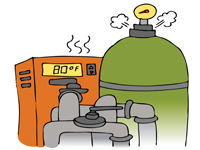

<p><img class=" alignright size-full wp-image-181" style="margin: 5px; float: right;" src="http://schoolnewsnz.fastrackdev.com/wp-content/uploads/2011/10/pool_heating.jpg" alt="pool heating" width="200" height="150" />Ensuring that school swimming pools are warm enough for children to swim in ;</p>
<p> <!--more--> </p>
<p>has always been a problem in New Zealand where the warmest temperatures often occur when the pupils are on holiday.</p>
<p>The ideal leisure swimming temperature is 25-27 degrees so it makes sense to maintain a pool at these temperatures when teaching children to swim. Most unheated pools are around 20-22 degrees for the majority of the swimming season, so a heating system is required to achieve a comfortable pool.</p>
<p>There are three types of heating systems: solar, gas and heat pump. Each has different characteristics which will affect their suitability.</p>
<p>Consider the following:</p>
<p>1. Required temperature and length of season – some systems can achieve seasonal swimming only.</p>
<p>2. Each pool is different – the geographic location has a big impact on what performance can be expected from a heating system, as does indoor versus outdoor. Each pool has its own microclimate which will affect how naturally warm the pool is.</p>
<p>3. Budget – each heating system will have a capital cost as well as an operating cost. Often the capital cost is not as important as the operating cost as the system is often paid for through fundraising or grants. The operating cost then has to come from the school&#8217;s operating budget.</p>
<p>4. Ease of operation – ideally, any system should be easy to use.</p>
<p><strong>Solar heating</strong></p>
<p>There are two broad types of solar heating systems: glazed and unglazed. Unglazed systems are predominately used for pool heating due to their lower installation cost. Unglazed systems are made from rubber or polypropylene, with the latter being the longer lasting due to the increased UV resistance. Polypropylene solar collectors are generally more expensive than rubber systems. The disadvantage of unglazed solar systems is that they lose heat in windy conditions and do not perform in cold ambient temperatures. Glazed solar systems do perform in colder and windier climates, but have a higher installation cost. The big advantage of solar heating systems is that they have next to no operating cost.</p>
<p><strong>Gas heating</strong></p>
<p>Reticulated gas heating systems are very reliable and can maintain a certain pool temperature year around if required, although the operating cost is very high due to the cost of gas and the relative low efficiency of gas heating. Gas heating systems also have the advantage of being the fastest heating, so can be used to heat a pool for short periods.</p>
<p><strong>Heat pumps</strong></p>
<p>Heat pumps used for heating pools in New Zealand are of the air source variety, i.e. they extract the heat from the surrounding air using a compressor, evaporator and heat exchanger to transfer it to the pool water. Heat pumps use a smaller amount of electricity (per kw) than the heat they extract from the air. This means they are more efficient than just heating a pool with an electric element. Their efficiency depends on the ambient air temperature, so they are not well suited to colder environments.</p>
<p><strong>Pool covers and rollers</strong></p>
<p>Regardless of heating system, a pool cover should be used. Approximately 70 per cent of a pool&#8217;s heat is lost through the surface and a good quality thermal cover will retain much of this. Rollers play an important role in obtaining maximum life from the cover.</p>

Curriculum rewrites at the Ministry of Education are struggling with a lack of clarity, according…
Opportunities are critical for preteens to build confidence and capability, says Chisnallwood Intermediate, acclaimed for…
AI detection tools are trained on native English users, which could create bias.
Opinion: Why the Minister’s announcement on open-plan classrooms distracts from what really matters in education.
Positive wellbeing means resilient communities and effective learning.
A new campaign from the Teaching Council of Aotearoa New Zealand aims to lift the…
This website uses cookies.